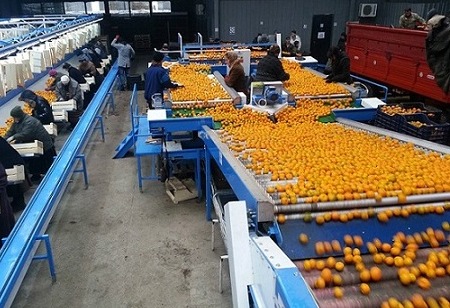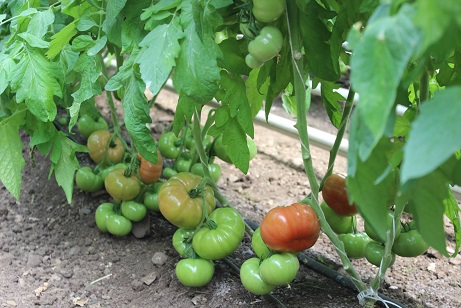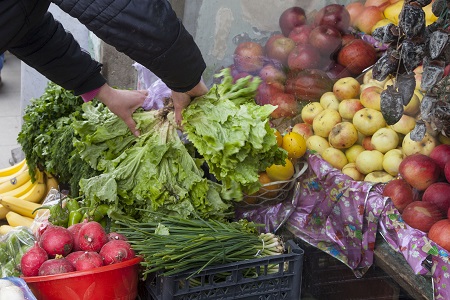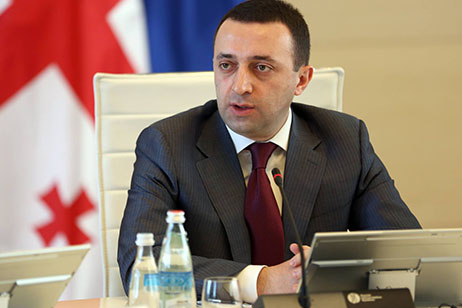Agriculture: The year in review

Government calls 2013 revolutionary
Looking back at the challenges in 2013, the government states that the key concern has been to stimulate the pheasants and farmers to grow their crops and commercializing the agriculture sector. These attempts, according to the Ministry of Agriculture of Georgia, have encouraged the growth of harvests and diversification of market.
"In 2013, the main strategy of the Agriculture Ministry was to develop the sector in a short-term period and we could call this a revolutionary year as there were implemented many successful projects that made the financial resources more achievable for farmers, pheasant and entrepreneurs, Shalva Pipia, the Ministry of Agriculture said at a conference on December 16, as he summed up Georgias agriculture achievements of 2013.
The event, held at Expo Georgia exhibition hall in Tbilisi, was also attended by high officials from the government and private sector including Nodar Khaduri from the Ministry of Finance and Minister Davit Narmania of the Regional Development and Infrastructure Ministry of Georgia.
Assessing the results for the year, Pipia called the Small Farmers Spring Supporting Agricultural program unprecedented, Using the nominal and combined cards for the small farmers, they managed to cultivate the lands and receive the agricultural materials and inventory free of charge.
It total, under the Small Framers Spring Supporting Agricultural program, more than 710385 farmers received 195.5 million GEL and cultivated the 207.3 thousand acres of land in Georgia.
While speaking of the new projects and services implemented by the Agriculture Ministry, Pipia told the guests about the assisting projects, including the a loan for the farmers called preferential agro-credit, the agriculture cooperatives agency for granting and terminating the status of individual cooperatives, and the European Neighbourhood Program for Agriculture and Rural Development (ENPARD Georgia), to enhance agricultural production and rural development.
The agriculture companies have the opportunity use the preferential agro-credit for developing the business and since the launching the project, more than 8 thousand farmers have been issued parts of the 220 million GEL credit. The preferential resource helps companies turnover their capital.
Moreover, in the framework of the preferential agro-credit project, 53 new businesses have been financed.
Pipia also underscored the importance of Rtveli 2013, which is the grape harvest season and the state subsidy introduced for mandarins producing farmers.
At the event, the state officials noted the works that were implemented for rehabilitation of irrigation and drainage canals.
"After the rehabilitation of the irrigation and drainage systems, the harvest will increase by 40-50%, Pipia noted.
Development challenges for 2014
Next year, the government plans to continue work on improving the infrastructure and seeks to tap the potential for export markets.
In particular, the nearest agenda includes increasing the quality and safety of the Georgian produced agriculture products.
"Simultaneously, we work for developing the export markets in EU as deep and comprehensive free trade agreement (DCFTA) will come into force between EU-Georgia from September 2014. Georgia has to be ready to increase the export in EU market, Pipia said.
Mulling over the export diversification, Pipia noted that the government works to close the agriculture reforms for the EU. On this regards, the Agriculture Ministry will propose the new law about food safety in the nearest future.
The Minister of Regional Development and Infrastructure of Georgia, Davit Narmania said that the main attention will be paid to the quality of the imported products.
"We have to take care for the health and safety of Georgian people and thats why we will take special control of the food products. These attempts will also stimulate the local quality products development and replace imports with local product, Narmania said.
In general, 50% of the population is employed in agriculture, while the sector contributes to 8-9% of GDP.The agriculture processing enterprises equals 4% of the GDP.
 Tweet
Tweet  Share
Share



